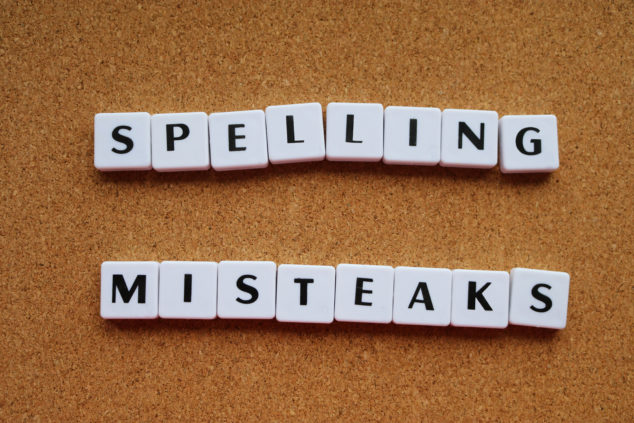
英文句子内有拼寫錯誤都不一定導致令別人誤解意思,但在某程度上影響讀者對作者的影響。完成以下英文練習題你便知道我們最常見的英文拼寫錯誤。
Let's have a ___________ on Saturday.
This spelling mistake probably comes from the abbreviations 'B-B-Q' and 'Bar-B-Q', but the original word has no 'q' - that sound is spelt 'cue'.
If you get lost, you should keep ____.
The adjective needed here is 'calm'. A 'Clam' is a type of shellfish.
He put on his ______ and went out.
What you wear each day are 'clothes' (always plural, with an 'e'). 'Cloth' in general is material and 'a cloth' or 'cloths' (without 'e') are small pieces of material, e.g. for cleaing: She go a cloth and cleaned the window. The spelling is consistent with pronunication: the silent 'e' on 'clothes' makes a long 'o' sound, as in 'nose'. No 'e' on 'cloth' makes a short 'o' sound, rhyming with 'pot'.
He has _____ hair.
This confusion may be caused by difficulty in pronouncing the 'l' sound. 'Curry' is spicy South Asian food, while 'curly' is the adjective for hair in round curls. E.g. We had a really hot Indian curry last night.
The government should _____ with the problem of air pollution.
The verb needed here is 'deal with', meaning to 'do something about'. 'Due' is not a verb and may be wrongly used here because 'deal' is sometimes mispronounced with the 'l' sounding like 'u'.
I love cooking. _____ rice is my favourite.
This misspelling is the past participle of the verb 'to fire' (as for a gun). What is needed is the past participle of the verb 'to fry'.
In the country we can breathe the _____ air.
'Flesh' is raw meat. This mistake may come from pronouncing the 'r' of 'fresh' like 'l'.
_________, teenagers have much more money to spend.
The adverb 'nowadays' always ends in 's'.
I don't think ______________ have much time to read.
'Nowaday' cannot be used as an adjective. The closest to this meaning is to say 'people today', or use 'nowadays' (with an 's') as an adverb at the end of sentence. E.g. I don't think people have much time to read nowadays.
Many Hong Kong people travel ________ for holidays.
'Overseas' always has an 's', both as an adverb above as an adjective here. E.g. Overseas holidays are very popular.
We went hiking in the hills and then had a barbecue. It was a _______ day.
This misspelling gives 'prefect' (風紀), a senior student with authority for discipline. The intended word is 'perfect' - meaning ideal.
The school _________ gave us a holiday the day after Sports Day.
The head of a school is the 'principal', a noun derived from the adjective meaning 'main or most important' By contrast, 'principle' is an abstract noun meaning 'a general truth or guiding belief or rule'. E.g. She wouldn't do that as she has strong moral principles.
The ______ in this ship are very high.
These two words with very different meanings sound similar except 'price' end with the 's' sound while 'prize' ends with the 'z' sound. E.g. She won two prizes for her good results.
I'm _____ interested in poetry.
'Quiet' and 'quite' are often confused in writing, but the sound is different. In 'quiet' the 'e' adds another vowel so it rhymes with 'diet'. The 'e' is silent at the end of 'quite' (which rhymes with night).
The fashion model was very ___.
The adjective for attractively thin is 'slim'. 'Slime' is an unpleasant slippery liquid, e.g. produced by snails and slugs, or on the surface of stagnant water. E.g. The ugly monster emerged from the water, covered in slime. As with 'cloths/clothes' earlier, the spelling is consistent with pronunciation. The silent 'e' on 'slime' makes a long 'i' sound rhyming with 'time'. No 'e' on 'slim' makes a short 'i' sound rhyming with 'Tim'.
His mother gave him a _____ to eat at recess.
This spelling mistake creates a big difference in meaning: A 'snack' is a small amount of food eaten between meals. A 'snake' is a reptile that crawls on the ground. E.g. When you're walking in the hills, watch out for snakes. As with 'slim/slime' earlier, the spelling is consistent with pronunciation. The silent 'e' on 'snake' makes a long 'a' sound rhyming with 'bake. No 'e' on 'snack' makes a short 'a' sound rhyming with 'back'.
Which one is correct?
The verb needed here is 'to sunbathe' with an 'e'. The silent 'e' at the end makes a long 'a' sound, following normal phonics patterns. The activity is 'sunbathing'. E.g. We'll go sunbathing on the beach.
